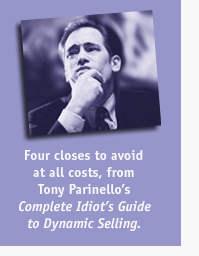
Four Fatally Flawed Closes
| Продажи | ||||
| Sales.com | ||||
| Closing | ||||
by Graham Denton
In the bad old days of sticking it to the buyer, the drummer-and-huckster contingent developed "closing" strategies that were designed to get ink on the contract whatever the customer's real needs. These time worn tricks of the trade are still in use, but with today's sophisticated customers and everybody's increasing reliance on long-term partnerships, they only can work to the professional's disadvantage. Anthony Parinello, in his Complete Idiot's Guide to Dynamic Selling, singles out four of these "closes" for special mention, explaining how each of the four is fatally flawed.
 Cutting
the Price Close. The two significant drawbacks to discount closes,
says Parinello, are that they "become habit forming for salespeople, to
the notable detriment of the company's profit margin," and that they give
prospects the impression that, in spite of the discount, they could have
gotten an even better deal if they'd held out longer. His tips: (1) Add
value instead of cutting the price. (2) If you're offering lower-than-list
prices, let them know up front that this is what you're doing.
Cutting
the Price Close. The two significant drawbacks to discount closes,
says Parinello, are that they "become habit forming for salespeople, to
the notable detriment of the company's profit margin," and that they give
prospects the impression that, in spite of the discount, they could have
gotten an even better deal if they'd held out longer. His tips: (1) Add
value instead of cutting the price. (2) If you're offering lower-than-list
prices, let them know up front that this is what you're doing.
No Risk Close. Or: "Try it out for a few days and, if you don't like it, return it." This sounds like an attractive way to get your product, not just your foot, in the customer's door, but its success depends on your conviction that they will in fact like it. What if they don't? To a customer, "no risk" easily can translate into "no commitment," and that in turn can translate into your storeroom getting filled up with "used capital investment." Solution: Train your customers on your products before they "borrow" them, in demos and in-services at your facility. This serves to qualify them before you take the risk.
The Show Special Close. This is the "special deal" that's available only at this trade show or convention, or until the end of this month, or as a liquidation one-timer. The drawback is in the potential appearance of unprofessionalism. When you constantly offer limited-time-only deals, you risk looking like the company that is endlessly "going out of business," and of reminding your potential customers of the "local swap meet." Better, says Parinello, to confine your special deals to your special customers -- those whose loyalty has demonstrated that they deserve them.
Make a Choice Close. This is one of the oldest and most presumptuous of all closing tactics. In fact, it's often called a presumptive close because the salesperson assumes that the customer is ready to say yes, and just needs help in refining his or her requirements: Hubcaps or wire wheels? Credit card or check? "You probably can see this one coming a mile away when salespeople try to get you to commit to a purchase. How do you imagine your own prospects feel when they hear it from you?" That's right --insulted. So unless you enjoy insulting your customers' intelligence, the best advice is to avoid this technique entirely. A good backup position, Parinello advises, is to "make sure your question accepts and respects the prospect's current state of knowledge."